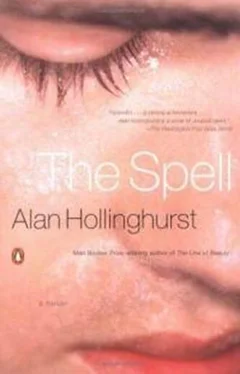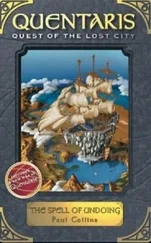
Alan Hollinghurst
The Spell
1998
He wondered if the boy had lost the way. They had started out on a driven track half-covered with small noisy stones; but it faded, was found again for half a mile, where it followed the rim of a dry wash, and then died away among the windswept contours and little dusty bushes of the desert. The pick-up roared on across long inclines of grey dirt. The boy kept his foot down and stared straight ahead, as if unable to consider the possibilities that lay to left and right. He was almost smiling – Robin couldn’t decide if from nerves or from the pleasure a local person has in scaring and disorienting a stranger. An empty bottle rolled and clinked against the metal supports of the bench-seat. Robin sat with his forearm braced in the open window, and grunted involuntarily at each bump and drop: academic research had never been so wayward or so physical. He found that he was smiling too, and that he was not only shaken but happy.
They reached a low crest and there beneath them spread thirty or forty miles of silvery waste, crossed by the quick eclipses of windy sunlight; the wide plain was rifted with gulleys and dry riverbeds, and climbed distantly to mountains which were radiant towers in the west and unguessable obscurities in the blackly shadowed south. This was what he wanted to see: it was what had brought a rich man and his architect here half a century ago. It wasn’t a terrain that could be ploughed or grazed or humbled by use: nothing could have altered unless by the gradual violence of winds and storm rains. The pick-up slowed, and Robin imagined that even his guide, who had surely seen nothing but this country all his life, was responding to its magic or its admonishment.
“What are those mountains called?” he shouted over the churning of the engine and the racket of stones and grit against the bottom of the vehicle. The boy looked stoopingly across, and out beyond Robin at the morning-bright bluffs to the west. He nodded several times, perhaps he had only understood the word mountains, or was hesitating before so many mountains, with so many names.
Suddenly the cab was full of sand. The boy gave a wordless shout and the pick-up pitched sideways, the windscreen was dark with sliding sand, sand pumped through the open windows in a pelting rattle and in a moment was heavy in their laps and round their feet. Robin squeezed his eyes shut on the sting of it, and felt the boy’s arm in his side, scrabbling for the gear-shift. He gulped a breath and was choking and spitting out sand, while the van stood still, or was it vaguely sliding. Then the engine rose to a scream, the sand came alive again, and they were lurching upwards and ahead in a panic of burning revs. Robin thought they wouldn’t do it, weighed down by the element they were struggling with. He wondered if the sand was bottomless.
When they were free of it they shot forward across the slope, as if the racing machinery couldn’t be reined in; or as if the invisible pit they had blundered into might follow after them, like a hungry and offended spirit of the place, clothed in a spiralling storm.
There wasn’t much to see, and as Robin dawdled reverently around with his camera and his notebook he was unsure if the scare in the car had made the destination more preciously perilous or more evidently not worth the effort. Much of the house had been built of wood, marked grey and rose in Wright’s insouciant sketches, or of canvas, which was useless against the freezing desert nights, and equally combustible. All that remained standing, at the end of a terrace of fissured concrete, was the rough bulk of the hearth and the chimney-stack, a little tower of boulders, the bluntly symbolic heart of the place. Robin knelt among ashes, paper rubbish, a half-burnt creosote-bush, and squinted up the open flue at the square of bright eggshell. People had been here, hundreds probably, scholars and students, and the unfriendly reflective men who lived in the spell of the desert. He touched the blackened stones and thought of other lonely places – roofless cottages on Welsh mountains, pissed-in pillboxes squatting in the fields at home; and there was something of the outpost in this ruined site, of duty and homesickness. But then he straightened up and saw the view.
Away to the right, the boy was bailing sand out of the footwells of the car; he did it slowly, with an air of resentment at his own folly, and doubtless respect for the heat. Nothing was worth rushing – except driving itself, of course, unlicensed, off-road: that was the thrill for a teenage Indian with a father drunk and hostile at nine in the morning. Robin felt the constraints of the boy’s silence drop away: the day was balanced between the upland cool in which it had started and the steeper heat to come. He took off his shirt, and felt deliciously both hot and cold at the same time. He clambered up and away from the site, among shaly hillocks, and chose a place to sit.
He had a copy of Wright’s plans in his knapsack, and a single photo of the finished house, leached of detail by sunlight and reproduction – a copy of a copy of a copy. From here he could see the vestigial triangle of the layout, and, matching a distant mountain with a grey shadow in the picture, admire the defiant caprice of the project. He hoped he had shown a similar spirit in coming here.
He had never seen a desert before, nothing much emptier than the cropped Dorset heaths of his childhood, with clumps of pine, and the broom-pods popping like pistol-caps in the June heat; nothing much grander than Snowdon or Sea Fell. He liked it, the warm smell of the sagebrush, and the bitter-green herblike plants that grew sparsely under the rocks. The place was desolate but the air was benign, and had high flickers of birdsong in it – what were they, springing upwards from the shelter of bushes? Not larks. The word fieldfare came sheepishly to mind.
He was twenty-three, and it was his first time in America. He found the company of Americans made him stiff and formal, though these were qualities he was unaware of in himself before. His vocabulary felt embarrassingly large and accurate, though in conversation he had a recurrent sense of inarticulacy. He was doing research for a doctoral thesis, but knew he was ignorant of the simplest things in the landscape he had come, in part, to see. Still, he anticipated discovery; as he sat frowning into the sun, with little breezes curling over his naked back, he felt he had Americas in him – he had never been so alert or so free.
A little way off from the concrete standing he scuffed over something white and squatted down to pick it out of the dust. It was a rough piece of sanitary porcelain, about three inches square, with the letters SEMPE on it, perhaps part of SEMPER, forever. He smiled at that, and because there was also an architect called Semper, so very different from Frank Lloyd Wright. With a quick suppression of ethical doubt, he opened his knapsack and dropped it in.
Back at the pick-up his driver sprawled behind the open passenger-door and smoked a cigarette. His blue T-shirt was dark with sweat, and his cheeks were red in his wide brown face. He raised his eyebrows as if to say “All done?,” and Robin said, “Did you get it cleaned out?”
The boy flicked away the stub and stood up, shrugging his head from side to side and tugging up his belt. The open bed of the vehicle wouldn’t have passed any very exacting inspection, but it was probably good enough for this dusty country. Robin assumed that no worse damage had been done. “Go back,” said the boy, in a way that was both a question and its answer, but also held a hint of a rebuff. Robin was faintly hurt that, even after the fright they’d shared, his companion was so uncompanionable; he hardened himself against him, and protected his elation, which in some novel way sprang both from the visionary light of the place and from a thrilled muscular sense of himself. And a little bit, of course, from having walked a site that was sacred – at least to one of them. “Yes, let’s go,” he said airily, and turned for a last attempt at consuming the view. The distances had begun their delusory oscillations. He felt he wanted to store up the light inside him.
Читать дальше













